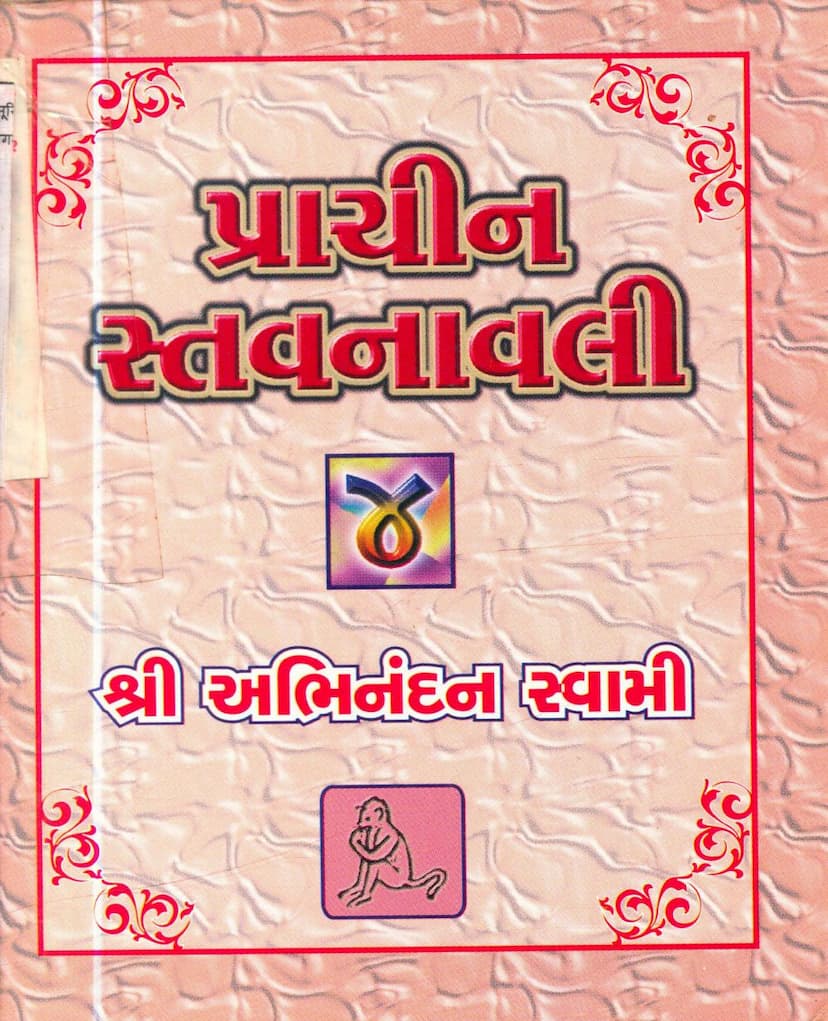Prachin Stavanavli 04 Abhinandan Swami
Added to library: September 2, 2025

Summary
Here's a comprehensive summary of the Jain text "Prachin Stavanavli 04 Abhinandan Swami" by Hasmukhbhai Chudgar, based on the provided pages:
Book Title: Prachin Stavanavli 04 Abhinandan Swami (Ancient Hymns - Volume 04: Lord Abhinandan Swami) Author: Hasmukhbhai Chudgar Publisher: Hasmukhbhai Chudgar
This book is a collection of devotional hymns (stavan) dedicated to Lord Abhinandan Swami, the fourth Tirthankara in Jainism. It aims to provide a collection of ancient and accessible hymns for spiritual contemplation and devotion.
Key Themes and Content:
-
Introduction (Pages 4-5): The introductory sections emphasize the importance of Paramatma Bhakti (devotion to the supreme soul) as a means to transcend external conditions and achieve the state of the soul's true nature (Atma-dasha). It highlights that true devotion leads to inner strength and liberation. The importance of recognizing the true nature of the soul is stressed, as mere ritualistic devotion without understanding may not bring the desired bliss. The text suggests that even a few tears shed in devotion are more valuable than all the tears shed in worldly sorrows.
-
Namokar Mahamantra (Page 2): The book begins with an ode to the Namokar Mahamantra, highlighting its universal significance and the power derived from meditating on its 68 syllables, representing the nine supreme beings and the essence of the fourteen Purvas. It is described as a source of ultimate happiness, prosperity, and the dispeller of all sorrows and obstacles.
-
Table of Contents/Index (Pages 6-8): These pages provide a detailed listing of the various hymns included in the book, along with the names of their composers. This indicates a rich collection of stavan authored by prominent Jain saints and scholars from different traditions and eras. The hymns are categorized by the composer, showcasing a wide range of devotional poetry.
-
Chaitya Vandan Vidhi (Jain Temple Worship Procedure) (Pages 9-14): A significant portion of the book is dedicated to outlining the Chaitya Vandan Vidhi, the ritualistic worship performed in Jain temples. This section details the specific mantras and sutras to be recited, including:
- Ichchhami Khama Saman Sutra: For seeking forgiveness and bowing to the divine and ascetics.
- Iriyavahiyam Sutra: For purifying oneself from unintended harm to living beings while walking.
- Tassa Uttarini Sutra: For further purification of any remaining faults.
- Annath Sutra: Describing the sixteen occasions for kāyotsarga (standing immobile for meditation/penance).
- Logassa Sutra: A hymn of praise for all twenty-four Tirthankaras.
- Jain Kinchit Sutra, Namukkun Sutra, Javant Cheiyai Sutra, Javant Kevi Sahu Sutra: Various other invocations and salutations to Jain idols, scriptures, and ascetics.
- Namo Ariy Siddha Acharya Upadhaya Sarva Sadhu: A direct salutation to the Pancha Paramesthi (the five supreme beings).
- Jay Viyaraya Sutra: A prayer for victory and well-being.
- Arihant Cheiyaiyan Sutra: A specific kāyotsarga for venerating the idols in the temple.
-
Devotional Hymns (Stavan) for Lord Abhinandan Swami (Pages 15-65): The core of the book features the collection of stavan dedicated to Lord Abhinandan Swami. Each hymn is attributed to its composer, offering diverse perspectives and expressions of devotion. The stavan cover various aspects:
- Life and Teachings: Many hymns describe the birth, asceticism, omniscience, and liberation of Lord Abhinandan Swami. They mention his parentage (King Samvara and Queen Siddhartha), his birthplace (Ayodhya), his symbol (Monkey), his lifespan, and his physical attributes.
- Praise and Adoration: The hymns express deep reverence, love, and admiration for the Lord's qualities, such as his compassion, omnipotence, enlightened speech, and his role as a spiritual guide.
- Personal Devotion: Several stavan convey the personal feelings and experiences of the devotees, their longing for the Lord's darshan (vision), their sense of surrender, and their aspirations for spiritual progress and liberation.
- Philosophical Insights: Some hymns touch upon Jain philosophy, the nature of the soul, the consequences of actions, and the path to salvation.
- Musical and Poetic Styles: The hymns are written in various regional languages and poetic meters, reflecting the rich devotional literature of Jainism.
-
Thaya (Concluding Prayers/Dedications) (Page 67): This section includes concluding prayers and dedications by prominent composers like Shri Vijayji and Shri Veer Vijayji, summarizing the essence of devotion and its benefits.
-
Amrut Kan (Nectar Drops) (Page 68): This section contains a message attributed to Acharya Shri Bhuvanbhanusoorishwarji Maharaj, emphasizing the profound grace of the Tirthankaras and the importance of being "mad" after them, highlighting that union with the supreme soul in worship is the greatest yoga. It urges gratitude towards the Tirthankaras for guiding souls from lower realms.
-
Life Sketch of Lord Abhinandan Swami (Page 69): This page provides a concise biographical summary of Lord Abhinandan Swami, listing his parentage, birthplace, auspicious dates (birth, initiation, omniscience, liberation), lifespan, physical characteristics, symbol, number of Ganadharas, chief disciples, and other significant details related to his life and mission.
Overall Purpose and Significance:
"Prachin Stavanavli 04 Abhinandan Swami" serves as a valuable resource for Jain followers to connect with the teachings and life of Lord Abhinandan Swami through devotional hymns. It aims to:
- Promote Devotion: Encourage and facilitate deep spiritual devotion to the Tirthankaras.
- Preserve Tradition: Collect and present ancient devotional literature for future generations.
- Educate: Provide information about the life and teachings of Lord Abhinandan Swami and the principles of Jain worship.
- Inspire: Motivate readers towards spiritual upliftment and the pursuit of liberation.
The compilation reflects the diverse devotional practices and literary traditions within Jainism, offering a comprehensive collection of prayers and praises for a significant Tirthankara.